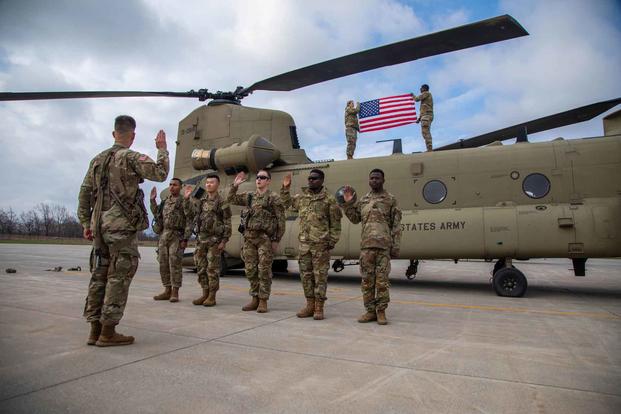The Army released a new guidance Friday specifying the military occupational specialties it needs soldiers to move into when reenlisting in order to meet the branch's retention and restructuring goals for 2024.
Referred to as "precision retention," the program specifically highlights overcrowded occupational specialties, such as cavalry scouts and military police, as well as incentive bonuses and promotion opportunities if troops will consider reclassifying.
"The main difference, and our approach this time is a little bit more succinct, is that we're trying to apply a level of precision and focus on particular critical [military occupational specialities] that the Army has identified," Sgt. Maj. Jonathan Uribe-Huitron, the senior enlisted soldier overseeing personnel policy, told reporters Thursday. "[We're] still having the same process as we do any other reclassification -- that is, creating the conversations that take place between the commander, the individual soldier, and a command career counselor."
Read Next: Fired Navy SEAL Captain Was Arrested for Drunk Driving Months Before His Relief
Throughout fiscal 2023, the Army reclassified about 3,000 soldiers, Uribe-Huitron said. As the branch continues to fight recruitment issues and seeks to restructure itself, however, the hope is this new focus on "precision retention" will keep troops not just in the Army, but in the right places.
In February, the service announced that it would be slashing approximately 24,000 positions as it moves from specializing in counterinsurgency warfare into a more modern and versatile style of combat, with a focus on drones and cyber warfare. While the plan cuts about 3,000 jobs in the special operations community, it adds another 7,500 in specialties that can help provide air-defense and counter-drone capabilities.
"We're moving away from counterterrorism and counterinsurgency. We want to be postured for large-scale combat operations," Army Secretary Christine Wormuth told reporters in February. "So, we looked at where were there pieces of force structure that were probably more associated with counterinsurgency, for example, that we don't need anymore."
Cavalry squadrons can expect about a 10,000-troop cut, reporters were told in February, which was reflected in this week's guidance. Troops with the 19D cavalry scout classification are considered to be part of an oversaturated field and therefore can expect to have the reclassification conversation when their reenlistment window opens.
For example, airborne soldiers -- those who are non-promotable sergeants -- currently with the 19D classification stationed at Fort Liberty, North Carolina, will be allowed to move over to 11B, infantryman, with no additional training required. Cavalry scouts not stationed at Fort Liberty would instead be sent to an airborne position after being reclassified.
But some other soldiers looking to take advantage of the new retention policies will have to go through the appropriate training pipelines. For example, while Chief of Armor Brig. Gen. Michael Simmering has waived the formal training requirement for cavalry scouts looking to move into the Bradley fighting crewman job, soldiers would still need to go through training to become electronic warfare specialists.
Those not in their reenlistment window can also voluntarily request to be reclassified, the guidance said, but soldiers who choose new specialities that involve training may be told no if there are no training school spaces available.
To sweeten the deal, the Army is offering reclassification bonuses that range based on a number of factors, including a soldier's years in service, rank and how many years they plan on reenlisting for.
The bonus ranges are immense: A specialist, or E-4, cavalry scout could bank anywhere from $5,900 to $72,000 if they switched over to Patriot fire control operator, or 14E, according to the guidance. It will all come down to the individual soldier and the needs of the Army, a service official told Military.com, but "it is very likely" they are looking at the upper end of the more than a dozen offered bonuses and specialties.
In addition to offering reclassification bonuses, some jobs were highlighted in the guidance as offering a greater chance of promotion to sergeant or staff sergeant. For corporals or specialists hoping to reenlist and be promoted to sergeant, options include High Mobility Artillery Rocket System, or HIMARS, crewman; electronic warfare specialist; counterintelligence agent; and armor crewman.
Soldiers looking for another way to reach staff sergeant sooner should look toward becoming HIMARS crew members or M1 armor crewmen, the guidance said.
The question remains, however, as to whether soldiers in the cavalry scout and military police fields can expect to be forcibly reclassified when their time to reenlist comes. According to the guidance, "Soldiers serving in these [military occupational specialties] are restricted to reclassify to a new MOS and will not be approved to reenlist in current MOS without approval from [Army Human Resources Command]."
Whether a soldier is chosen for reclassification will ultimately be decided based on "the needs of the Army," the guidance said. Despite the language in the regulation, Army officials denied they would be pursuing this aspect of the guidance. “We are focused on voluntary reclassification and during FY24, no soldiers will be reclassified into an MOS they do not volunteer for,” Maj. Shahin Uddin, a public affairs advisor to the deputy chief of staff for personnel, told Military.com in an email.
At the end of the day, retention and reclassification are both normal processes, Sgt. Maj. Tobey Whitney, a senior Army career counselor, told reporters about the new guidance.
"This time, it has a little bit more attention. Just because there's rumors and speculation, it's causing families to be concerned," Whitney said. "But I want to alleviate their concerns and let every soldier out there and their family know that the Army has a place for every single one of them."
Related: After Missing Recruiting Goals, Army Announces New Occupational Specialty to Increase the Ranks












